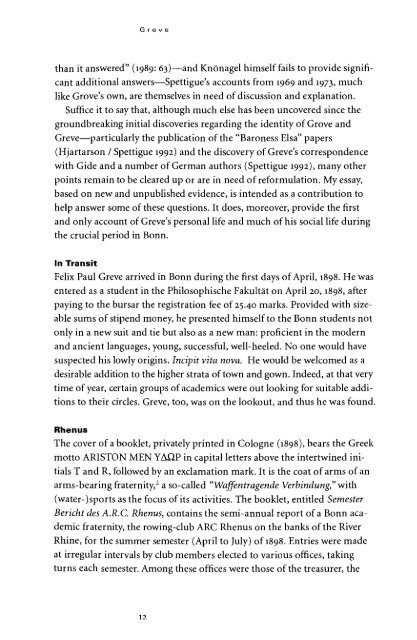Jean Rivard - University of British Columbia
Jean Rivard - University of British Columbia
Jean Rivard - University of British Columbia
You also want an ePaper? Increase the reach of your titles
YUMPU automatically turns print PDFs into web optimized ePapers that Google loves.
Grève<br />
than it answered" (1989: 63)—and Knönagel himself fails to provide significant<br />
additional answers—Spettigue's accounts from 1969 and 1973, much<br />
like Grove's own, are themselves in need <strong>of</strong> discussion and explanation.<br />
Suffice it to say that, although much else has been uncovered since the<br />
groundbreaking initial discoveries regarding the identity <strong>of</strong> Grove and<br />
Grève—particularly the publication <strong>of</strong> the "Baroness Elsa" papers<br />
(Hjartarson / Spettigue 1992) and the discovery <strong>of</strong> Greve's correspondence<br />
with Gide and a number <strong>of</strong> German authors (Spettigue 1992), many other<br />
points remain to be cleared up or are in need <strong>of</strong> reformulation. My essay,<br />
based on new and unpublished evidence, is intended as a contribution to<br />
help answer some <strong>of</strong> these questions. It does, moreover, provide the first<br />
and only account <strong>of</strong> Greve's personal life and much <strong>of</strong> his social life during<br />
the crucial period in Bonn.<br />
In Transit<br />
Felix Paul Grève arrived in Bonn during the first days <strong>of</strong> April, 1898. He was<br />
entered as a student in the Philosophische Fakultät on April 20,1898, after<br />
paying to the bursar the registration fee <strong>of</strong> 25.40 marks. Provided with sizeable<br />
sums <strong>of</strong> stipend money, he presented himself to the Bonn students not<br />
only in a new suit and tie but also as a new man: pr<strong>of</strong>icient in the modern<br />
and ancient languages, young, successful, well-heeled. No one would have<br />
suspected his lowly origins. Incipit vita nova. He would be welcomed as a<br />
desirable addition to the higher strata <strong>of</strong> town and gown. Indeed, at that very<br />
time <strong>of</strong> year, certain groups <strong>of</strong> academics were out looking for suitable additions<br />
to their circles. Grève, too, was on the lookout, and thus he was found.<br />
Rhenus<br />
The cover <strong>of</strong> a booklet, privately printed in Cologne (1898), bears the Greek<br />
motto ARISTÓN MEN ΥΔΩΡ in capital letters above the intertwined initials<br />
Τ and R, followed by an exclamation mark. It is the coat <strong>of</strong> arms <strong>of</strong> an<br />
arms-bearing fraternity, 2<br />
a so-called "Waffentragende Verbindung,"'with<br />
(water-)sports as the focus <strong>of</strong> its activities. The booklet, entitled Semester<br />
Bericht desA.R.C. Rhenus, contains the semi-annual report <strong>of</strong> a Bonn academic<br />
fraternity, the rowing-club ARC Rhenus on the banks <strong>of</strong> the River<br />
Rhine, for the summer semester (April to July) <strong>of</strong> 1898. Entries were made<br />
at irregular intervals by club members elected to various <strong>of</strong>fices, taking<br />
turns each semester. Among these <strong>of</strong>fices were those <strong>of</strong> the treasurer, the<br />
12

















